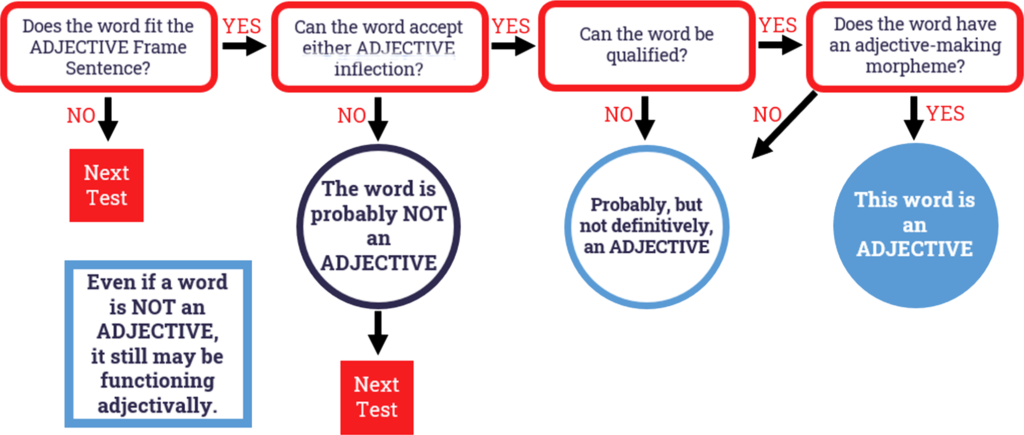Chapter 1: adjectives
An ADJECTIVE is a form-class word that typically modifies a noun (or nominal).
A prototypical adjective will have five characteristics:
- Adjective-making (derivational) morpheme
- Comparative or Superlative (using an inflectional morpheme) [-er] or [-est]
- Comparative or Superlative (using MORE or MOST)
- Can be qualified
- Can fit both slots of the adjective frame sentence: The <BLANK> man seems very <BLANK>.
These five characteristics serve as the primary tests for identifying adjectives.
In general, a prototypical adjective will have 4-5 of these characteristics. The more adjective characteristics a word has, the more prototypical it is. The fewer adjective characteristics a word has, the more it becomes a peripheral case.
Words like lovable or funny have four or five characteristics:
- Adjective-making (derivational) morpheme: lovable; funny
- Comparative or Superlative (using an inflectional morpheme): funnier, funniest
- Comparative or Superlative (using MORE or MOST): more lovable, most lovable
- Can be qualified: rather lovable; very funny
- Can fit both slots of the adjective frame sentence: The <BLANK> man seems very <BLANK>.
Peripheral cases have fewer adjective characteristics. Or a word might be considered peripheral if it does not fit both slots in the adjective frame sentence.
When adjectives fit best only in the first slot, they are attributive:
- The entire pizza seems very entire.
When adjectives fit best only in the second slot, they are predicative:
- The afraid man seems very afraid.
Members of all four form classes can be divided into further subclasses based on certain semantic features. These features often have grammatical consequences. The following are some of the subclasses of adjectives:
Attributive and predicative adjectives: Adjectives that only fit one of the two slots in the frame sentence are either attributive or predicative.
attributive adjectives occur before a noun, usually attributing a quality to that noun
- The entire pizza disappeared.
predicative adjectives occur in the predicate of a sentence and without a following noun
- Our teacher was aghast.
Predicative adjectives requiring complements: Some predicative adjectives accept or even require complements.
- My brother is fond. The sentence seems to be missing something.
- My brother is fond of frozen yogurt. The complement of <something> is a necessary addition to fond.
Gradable and nongradable adjectives: Gradable adjectives can be distinguished by qualifiers indicating intensity:
- somewhat late
- a bit late
- very late
- extremely late
Nongradable adjectives don’t normally occur with such qualifiers. The following qualified adjectives seem nonsensical:
- rather vertical
- somewhat perfect
- very double
- extremely triangular
When analyzing for adjectives, we classify the FORM of the analyzed word as adjective. You can use the following flowchart to guide your analysis:


